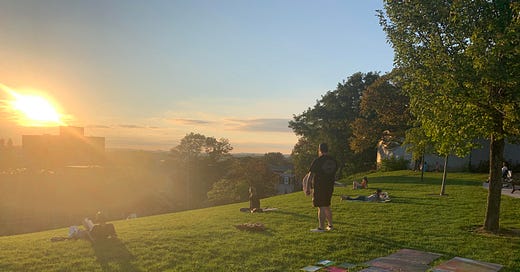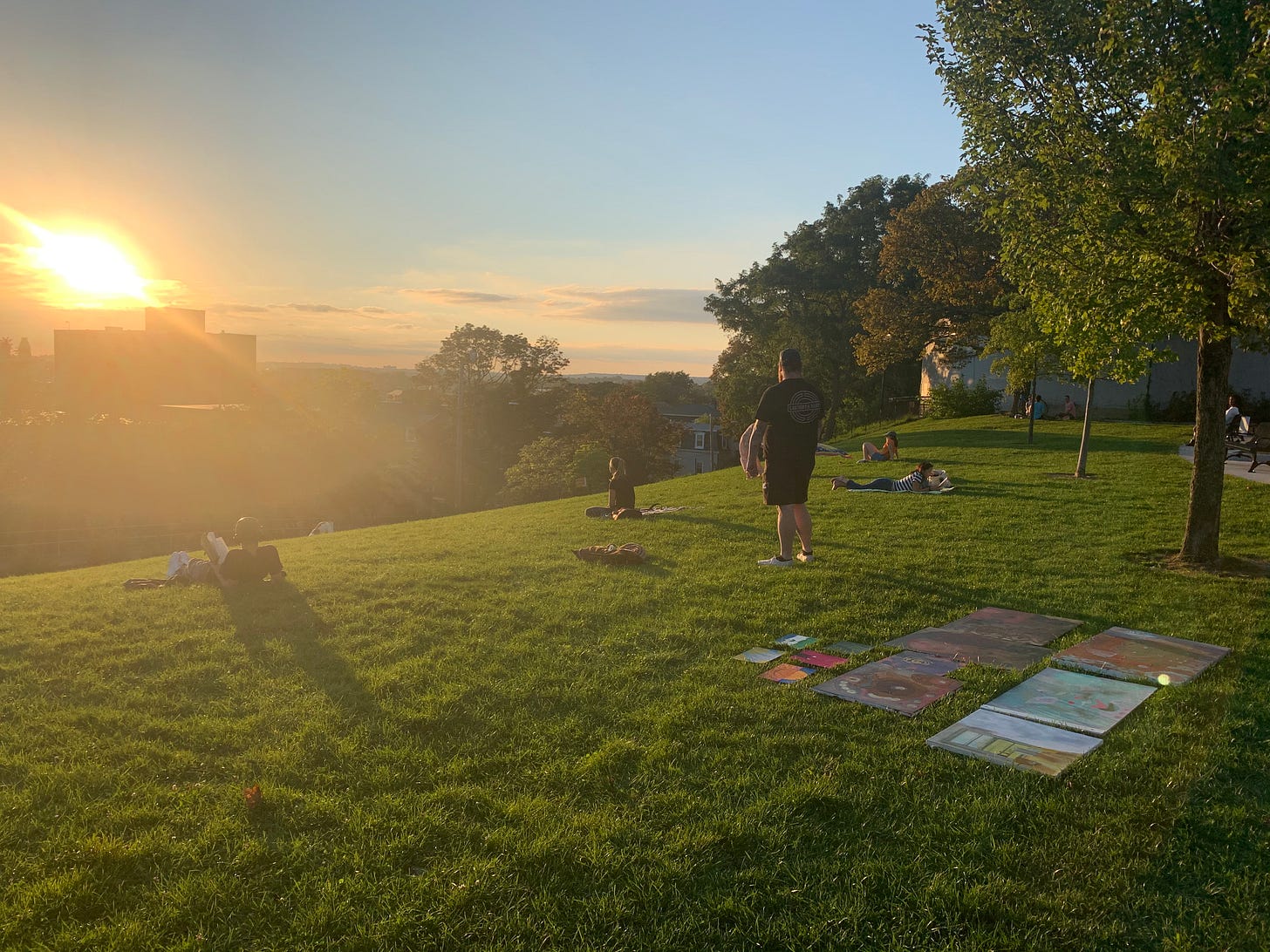A college acquaintance once told me it was unethical to date someone you didn’t think you’d marry.
He declared this while stoned on a spring break trip in San Diego, posturing as if he had the answers. At least he’s shown he’s a disciple of his own doctrine on marriage, having dated only one person in the time I’ve known him (the two of them just moved into an apartment in New York’s upper west side).
I laugh about it now, but at the time when he made that comment, I took offense. I’d dated a number of people I had no intention of marrying, and I didn’t—don’t—see anything wrong with that.
Then, 21 and a senior in college, everything in my life changed quickly, but these changes largely occurred on an academic cycle, making them a little more predictable, if not easier to weather. Now, in my mid-20s, there’s just as much change, but I lack the stabilizing infrastructure of semesters; life changes happen suddenly and without warning.
Friends drift out of my city, out of my circle. People go back to school or finish school, move apartments or get new jobs. I still feel at a stage of my life too transitional to make partnered plans. I have changed so much since I first started dating people in college, and changed again as much in the years since I graduated. It’s impossible to anticipate who I will be in 10 years, and who I’ll want to be with. “I can imagine the kind of person your sister might end up with,” my mom said to me on the phone a few weeks ago. Then she continued, “But you? I have no idea.”
When I had my heart broken in July, my mom sent me a used copy of Ann Patchett’s book This is the Story of a Happy Marriage.
The book’s title and timing were comical. Reeling from the sudden end of my relationship, I was mortified to have anyone see me reading the collection, lest they assume it was a self help book about how to love more successfully than I had. I hid the spine while I read. I flipped the cover upside down to obscure the title. I devoured covertly.
Patchett’s book, more than the story of a happy marriage, is a collection of nonfiction essays she wrote as a way to finance her novel writing, which she viewed as her “real work.” She includes stories about her dog, a cross-country trip in a Winnebago, caring for her grandmother in old age, her friendship with a nun, learning how to scale a wall as she trained to join the LAPD.
And in the title essay, Patchett recounts her tumultuous road to a happy marriage. She writes: “I am setting out to tell the story of a happy marriage, my marriage, which does not end in divorce, but every single thing about it starts there. Divorce is the history lesson, that thing that must be remembered in order not to be repeated. Divorce is the rock upon which this church is built.”
Patchett’s first marriage was a disaster. Her boyfriend proposed, and she said no before he could even spit out the whole question. The broken pair continued living together, unhappily, until Patchett relented and they married. Their union lasted 14 months. As I read Patchett’s account, wide-eyed, I thought to myself, At least my relationship wasn’t that disastrous. At least we knew we could never marry each other.
At 25 (the same age Patchett was when her first marriage ended) I was fully unprepared to consider marriage. And yet, it was the looming prospect of matrimony that had contributed to the breakup in the first place.
A month before said breakup, my pandemic boyfriend accompanied me to a college friend’s wedding in Indiana. I sipped a whiskey sour and pretended not to have social anxiety in the wedding reception barn, when, unbeknownst to me, on the barn’s other side, a college classmate asked my boyfriend if he was thinking about “locking it down” with me.
He was not.
And the fact is, I wasn’t thinking about marrying him either.
He had just helped me through one of the hardest years of my life. Getting to the next day was my top priority, not decades of commitment to a person I was only starting to get to know.
In many ways—in enough ways—my pandemic boyfriend was exactly who I needed that year. He seemed unfazed by my rapidly fluctuating emotions and deteriorating mental health. He was even-keeled and fun and cool and incredibly online. He listened to new-to-me music and loved concerts with an intensity that matched my high-decibel fervor for live performance. Most importantly, he was there—at a time when no one else really could be in the midst of a pandemic. We lived conveniently close and saw each other every day. That consistency, knowing that someone else could hold me and watch the Beth Stelling Netflix special for the tenth time, was my greatest comfort when every other aspect of my life felt uncomfortable.
In providing solidity when I was living on the edge of myself, he saved my life. Unfortunately, that alone does not qualify us for a happy life partnership.
While writing this, I revisited Patchett’s essay. Between my annotated pages of This is the Story of a Happy Marriage, I found a slip of paper on which I had written a list of activities I thought could revitalize our limp relationship, should he take me back.
cards
book club
yoga
run
Oleana
concerts
camping
In fact, he did take me back, and for a few months, we tried to make it work. We played cards a couple times. We ran together once. We didn’t touch the other activities on the list. We barely touched each other. Our relationship was not revitalized.
As I re-encountered my months-old note, a bookmark between the pages, I found a lick of healing in Patchett’s words.
Early in the essay, she writes,
Standing waist deep in the swimming pool at Yaddo, I received a gift—it was the first decent piece of instruction about marriage I had ever been given in my twenty-five years of life. “Does your husband make you a better person?” Edra asked.
There I was in that sky-blue pool beneath a bright blue sky, my fingers breaking apart the light on the water, and I had no idea what she was talking about.
“Are you smarter, kinder, more generous, more compassionate, a better writer?” she said, running down her list. “Does he make you better?”
“That’s not the question,” I said. “It’s so much more complicated than that.”
“It’s not more complicated than that,” she said. “That’s all there is: Does he make you better and do you make him better?”
I am not convinced pandemic boyfriend and I made each other better, but for a time, we were who each other needed. He made an unsurvivable year of my life survivable. We were poorly matched for a lifetime together, but we were well matched for a brief now that no longer exists.
Last Thanksgiving, the two of us stayed in our apartments while all our roommates, and seemingly the rest of Boston, left town. It was a quiet, empty holiday, one liberated of expectation and obligation. We smoked weed in the middle of the day and bought cheese at H-mart (the only open grocery store) and watched The Queen’s Gambit.
This year, I spent Thanksgiving with a family much larger and louder than my own. We dressed up, drank liberally, ate heartily, making for a festive holiday. Beneath the jubilance, I mourned my quiet little pandemic holiday with my pandemic boyfriend.
In the midst of my darkest winter, he gave me what Patchett calls her second greatest gift: “He got me out. And then he let me go.”




I *love* this. Especially as someone who’s been laser focused on marriage since childhood and only just now reckoning with that at 30, haha.
Great essay! I think we are so much conditioned by society to have marriage as our goal to prove we are worthy, that we really need to force our way out of that mindset. I fell into the same trap, but then I got out. Didn't know about that essay from Patchett, I'll check it out. :-)